Home | Tours | Trip Reports | News | Team | Calendar | Links | Contact | Store | Mailing List
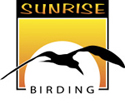
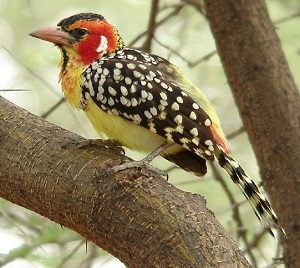 TANZANIA
TANZANIABirding Safari in the Serengeti
March 31 - April 11, 2026
Contact [email protected] to reserve your space!
Trip Cost & Travel Planning> Registration Form>
Tour
Registration, Terms,
Cancellation Policies>
Join us for an African safari in one of the most epic places on earth - TANZANIA.
Tanzania is one of our most memorable tours and we've long been wanting to get back there. On this tour, we will look for a vast array of special birds and witness the spring passerine movement against the backdrop of one of the world's greatest mammal migrations!
By April, Wildebeest, Zebra, Gazelles, Eland, Impala, even Elephants are on the move. With so many herbivores, we have excellent chances of seeing leopard, lion and cheetah while we bird one the of most striking landscapes of East Africa’s Rift Valley.
We’ll bisect the plains afoot Mt. Kilimanjaro, explore the lush forests of Mount Meru, descend into the vast crater of the Ngorongoro, take in the scenic palm savanna of Lake Manyara, bird the Baobab dotted woodlands of Tarangire, visit our ancestor’s lands of Oldupai Gorge, traverse the plains of Serengeti - home to some of Tanzania’s endemics, and explore the woodlands of Ndutu, where predators lurk beneath flat-topped Acacias.
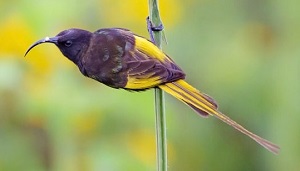 We travel by Land cruisers with the option for open-rooftops and each participant will have their own window. We’ll stay in safari-style upmarket lodges and tented camps while on tour and in a charming guest house while in Arusha.
We travel by Land cruisers with the option for open-rooftops and each participant will have their own window. We’ll stay in safari-style upmarket lodges and tented camps while on tour and in a charming guest house while in Arusha.
TANZANIA
Birding Safari in the Serengeti
March 31 - April 11, 2026
Contact [email protected] to reserve your space!
Photos: Red-and-yellow Barbet, Wildebeest and Zebra, Golden-winged Sunbird. Below, Grey-crowned Crane.
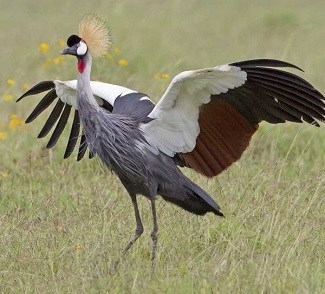 ITINERARY
ITINERARY
Day 1: Arrival Kilimanjaro, Tanzania
Plan on arriving at Kilimanjaro airport (airport code JRO) in northern Tanzania where you will be met and transferred to our lovely lodge. The tour begins with dinner tonight.
Day 2: Arusha National Park
Our first two days are devoted to exploring Arusha National Park afoot two of East Africa’s great peaks, Mt. Kilimanjaro and Mt. Meru. Here, dry acacia scrub gives way to luxuriant mist belt forests as one drives further up the slopes. Small troops of Colobus monkeys, with their long, drooping black and white hair, forage in the branches draped in “Old Man’s Beard” lichen. The birds are completely different to those we will see later in the trip. Here we’ll hope to soak up the likes of Narina Trogon and Hartlaub’s Turaco. The alarm calls of the monkeys betray hunting African Crowned Eagle flying overhead. We’ll look out for hulky Silvery-cheeked Hornbills flying above and delicate Blue Monkeys hiding in the dark foliage. We’ll see our first game here, with African Buffalo and Giraffe in the more open areas, and if we’re lucky, the dainty Harvey’s Red Duiker in the forest under story.
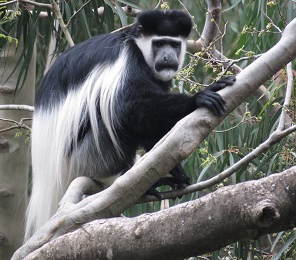
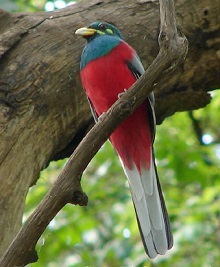
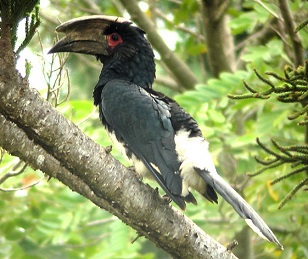
Photos: Colobus Monkey, Narina Trogon, Silvery-cheeked Hornbill
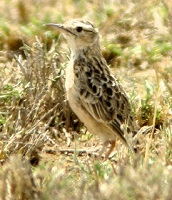 Day 3: Lark Plains
Day 3: Lark Plains
In sharp contrast to the luxuriant forests, Today we’ll explore the arid plains in the rain shadow of Mt Meru, where we’ll search for one of Africa’s rarest birds, the Beesley’s Lark. This endemic of north central Tanzanian is highly social and is restricted to a tiny area of open scrub habitat "lark plains". The lark plains also excellent for wheatears, harriers, sandgrouse – and if we’re lucky – even a White-headed Mousebird. African plains game, such as Thompson’s Gazelle and Plains Zebra, intermingle freely with the local Maasai herds of cattle and goats, in a seemingly harmonious tolerance.
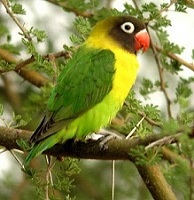
Day 4: Tarangire National Park & Lake Manyara
Tody we will explore a conservation area that links Tarangire and Manyara National Parks. The endemic striking Yellow-collared Lovebirds are common here, while Ashy Starling and Rufous-tailed Weavers abound too. The diversity of hornbills, woodpeckers, rollers and weavers is typical to African savannah birding. Nestled along the dramatic cliffs of the famous East African rift valley, Lake Manyara is perhaps most famous for its large concentrations of flamingos. Our lodge is set on the shoreline, in a sea of palm savanna where Secretarybirds and Black-bellied Bustards patrol the grasslands.
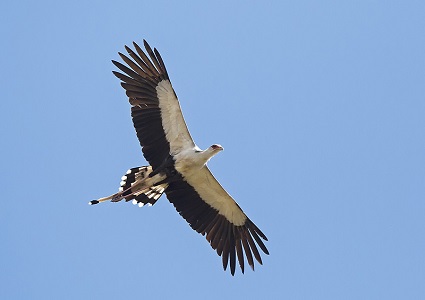
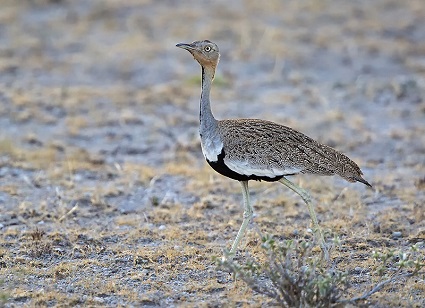
Photos: Secretarybird and Black-bellied Bustard by Kevin Karlson.
Day 5 - 11: Ngorongoro-Serengeti ecosystem
Today, we’ll head to the vast Serengeti-Ngorongoro ecosystem, home to one of the greatest amphitheaters on earth. It is hard to do justice to the feeling of awe and privilege in these vast, timeless landscapes so rich with wildlife. Here we will stay in the Ngorongoro-Serengeti ecosystem for a full week. We’ll drive up steep slopes of the Ngorongoro caldera, an ancient collapsed volcano, that looms above the plains. Looking westwards, the plains of the Serengeti stretch to the horizon and can literally teem with animals as far as the eye can see. The areas we will cover include:
NDUTU
As we drive into the open plains, we’ll pass areas where wildebeest migrate through, stretching from horizon to horizon. It is almost impossible to describe the sense of energy that one gets surrounded by these hordes of grunting animals and the predators that follow. The herds are dominated by Blue Wildebeest, also known as Brindled Gnu, but also contain vast numbers of Plains Zebra and Thompson’s Gazelle. The vulture watching is excellent here, with highlights being the huge Lappet-faced Vulture, and the scarcer Rüppell’s Griffon.
We’ll stay two nights in the area of Ndutu, known for its wildlife concentrations. Ndutu is 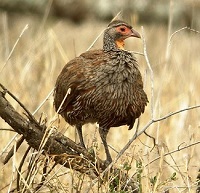 an excellent base to explore the southern ‘short-grass plains’ and their associated herds of animals. Kori and Hartlaub’s Bustards, Pallid Harrier and Caspian Plover, are just some of the birds we’ll encounter on the plains. Endemic Serengeti birds are common all around our
accommodation, with Fischer’s Lovebird breeding in tree-cavities along the walkways, and Grey-breasted Spurfowl displaying
early mornings in front of our rooms. The nearby Lake Masek is excellent for water birds. If we’re lucky, we might even see
cheetah chasing Thompson’s and Grant’s Gazelles across the open plains. We’re certainly likely to see a pride of engorged lion, lazily scattered around the previous night’s killings, while vultures, hyenas and jackals all wait for their opportunity to get some scraps.
an excellent base to explore the southern ‘short-grass plains’ and their associated herds of animals. Kori and Hartlaub’s Bustards, Pallid Harrier and Caspian Plover, are just some of the birds we’ll encounter on the plains. Endemic Serengeti birds are common all around our
accommodation, with Fischer’s Lovebird breeding in tree-cavities along the walkways, and Grey-breasted Spurfowl displaying
early mornings in front of our rooms. The nearby Lake Masek is excellent for water birds. If we’re lucky, we might even see
cheetah chasing Thompson’s and Grant’s Gazelles across the open plains. We’re certainly likely to see a pride of engorged lion, lazily scattered around the previous night’s killings, while vultures, hyenas and jackals all wait for their opportunity to get some scraps.
S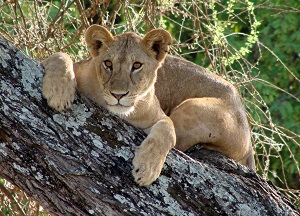 ERENGETI
ERENGETI
We’ll head northwards to Seronera in the central Serengeti. There are more trees here, offering a larger diversity of birds and our best chance of spotting a Leopard. Usambiro Barbet, Superb and Hildebrant’s Starlings, Silverbird, Ruaha Red-billed Hornbill and Grey-headed Silverbill are just some of the birds that we’ll encounter here. We’ll explore the area’s riverine loops, game drives and rocky kopjes. If we’re lucky we’ll even encounter the little-known Karamoja Apalis, and possibly the family groups of the Grey-crested Helmetshrike. Their floppy crests are definitely outdone by Long-crested Eagle, just one of the eagles we hope to encounter.
NGORONGORO CRATER
The rim of the Ngorongoro Crater is a completely different 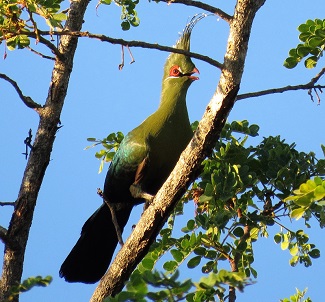 habitat to the grasslands below and is cloaked in forest and heathlands where we’ll search for Schalow’s Turaco and Golden-winged Sunbird. However, it is the crater floor that provides a natural sanctuary for the wildlife within and has become so famous. It is also the only reliable place in East African to see Black Rhinoceros, but the whole place is like a microcosm of Africa, with a good population of game animals – and lion and cheetah. The small lakes inside the crater hold a selection of Greater and Lesser Flamingos, storks and plovers. An excellent selection of raptors, such as Augur Buzzard, may be seen. We’ll stay a night on the crater rim, before descending the next morning to
explore.
habitat to the grasslands below and is cloaked in forest and heathlands where we’ll search for Schalow’s Turaco and Golden-winged Sunbird. However, it is the crater floor that provides a natural sanctuary for the wildlife within and has become so famous. It is also the only reliable place in East African to see Black Rhinoceros, but the whole place is like a microcosm of Africa, with a good population of game animals – and lion and cheetah. The small lakes inside the crater hold a selection of Greater and Lesser Flamingos, storks and plovers. An excellent selection of raptors, such as Augur Buzzard, may be seen. We’ll stay a night on the crater rim, before descending the next morning to
explore.
OLDUPAI GORGE
Some of our earliest ancestors have been unearthed by the Leakey family in the heart of the Ngorongoro Conservation area. Here lies the reconstructed footprint of our earliest ancestors and the world-famous archaeological site of Oldupai Gorge. It adds a sense of time and respect to think that the spectacle that stretches out in front of us has been going on for countless generations.
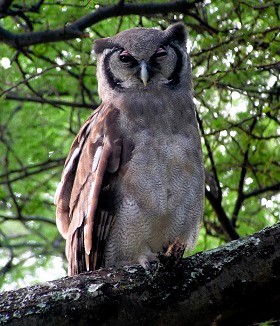
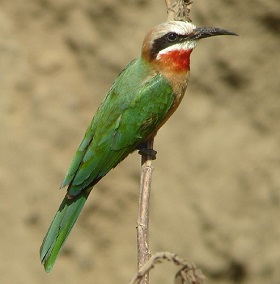
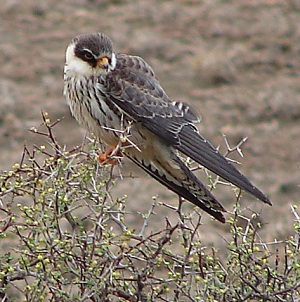
Photos: Verreaux's Eagle-owl, White-fronted Bee-eater, Amur Falcon
Day 12: Return to Arusha
Finally, when our time has come to retrace our steps, our journey will conclude eastwards to descend the Ngorongoro Crater rim through the lush forests, looking for our last views of turacos and Blue Monkeys in the tall canopies overhead. We’ll zigzag down to the Lake Manyara escarpment and back at Arusha, we’ll enjoy a relaxed lunch before we check in for our flight past Mount Kilimanjaro and back home.
Leaders: Steve Bird, Gina Nichol & local guides
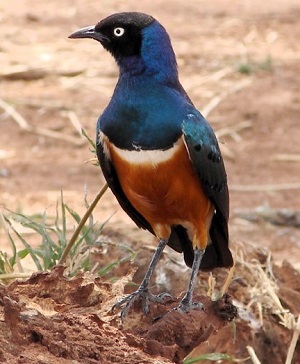 TANZANIA TANZANIABirding Safari in the Serengeti March 31 - April 11, 2026 Contact [email protected] to reserve your space! Registration Form> TOUR PRICE: $8495.00 provisional pricing per person, based on double occupancy and a minimum of 7 persons from Kilimanjaro airport (airport code JRO). Single
supplement: $995 provisional per person based on availability Deposit: $1000.00
per person
per tour.
Note:
Tour deposits
can be
paid by
credit
card via
PayPal.
Use this link to
make your credit card payment. Please
advise [email protected]
when you have made payment. Included in cost: All
accommodations,
meals during the tour,
and guide
services
as stated
in the
itinerary,
private
ground
transportation
during
the tour,
and park
entrance
fees. Not included: International flights, tipping for drivers and guides, travel insurance, excess baggage charges, private excursions, à la carte dishes, snacks, drinks, laundry, telephone calls and anything else of a purely personal nature. Also, any and all costs arising from pandemic or Covid-19 related issues are not included in the tour cost and are the sole responsibility of the traveler. These include, among others, the costs of Covid treatment, hospitalization, medical fees, transport, meals and accommodation in case of illness or quarantine, and the costs of any Covid tests needed before, during and after the tour.
Once
the tour is
confirmed to
go ahead, we
will send you
information
about booking
your flights.
**Please
note: Tour prices
are based on
quoted costs
from ground operators
(in their local
currency), estimated
fuel costs, and
the rate of exchange
the time of itinerary
publication.
The erratic nature
to global financial
markets makes
it difficult
to predict changes
in costs and
foreign currency
exchange rates
over the long
term. Since tours
are priced well
in advance of
the actual operation
of the tour,
tour costs, fuel
costs and exchange
rates can change,
sometimes drastically.
Depending on
the extent of
such changes,
it may be necessary
to implement
a surcharge on
this tour. If
a surcharge is
necessary, every
effort will be
made to minimize
the amount. Cancellations
and Refunds:
TRIP INSURANCE: PLEASE NOTE:
|
Phone: 203.453.6724